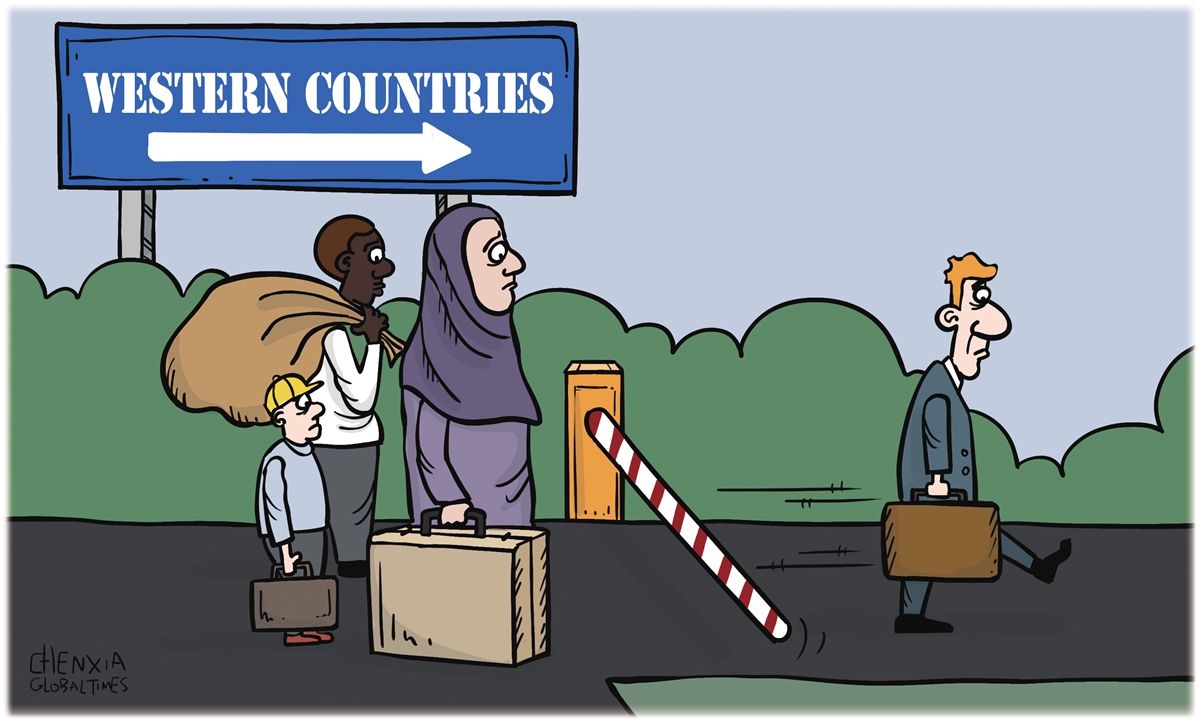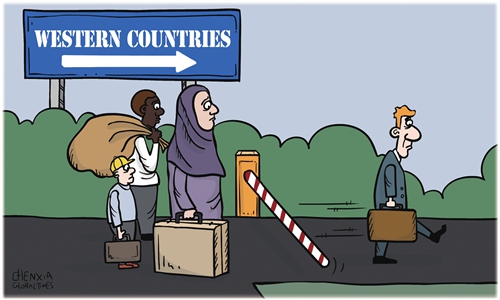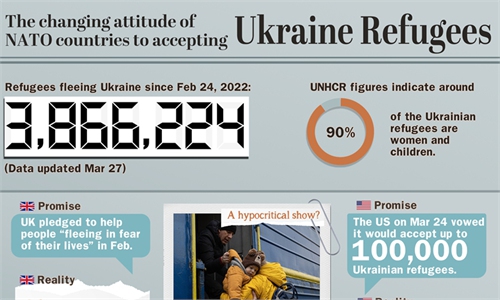
Illustration: Chen Xia/GT
As the Russia-Ukraine conflict continues, a constantly-deteriorating humanitarian crisis unfolds. As early as March 1, UN High Commissioner for Refugees Filippo Grandi warned that the situation could "develop into the biggest refugee crisis in Europe this century." Yet, facing an influx of refugees fleeing Ukraine, attitudes and policies vary across Europe.In his statement published on March 21, Grandi articulated "the ugly reality that some Black and Brown people fleeing Ukraine - and other wars and conflicts around the world - have not received the same treatment as Ukrainian refugees" due to racism and racial discrimination.
"We are, of course, deeply concerned about the plight of these people and the verified reports we have received of discrimination, violence and xenophobia directed at them in the course of their journeys both on the Ukrainian side and on the other sides of the borders," said Paul Dillon, a spokesman for the International Organization for Migration (IOM).
If countries accept refugees in a selective and discriminatory manner according to their different races, skin colors, and places of birth, we are not practicing humanitarianism, but tarnishing the spirit of humanitarianism. Yet the truth is, the double standards of Western countries are not only reflected in the selective treatment of refugees fleeing Ukraine, but also in many other aspects.
Facts have shown that the attitude of some Western countries toward Ukrainian refugees is completely different from their attitude toward refugees from Yemen, Syria, Palestine and other countries. Not surprisingly, Arwa Damon, CNN's correspondent wrote, "We are painfully seeing that refugees are selectively welcomed, and war criminals are selectively punished. It's not just the Western media that is biased; it's the Western world."
The international community expressed its grave concern and strong condemnation of the racist threats and xenophobic treatment faced by non-white people fleeing Ukraine. UN Secretary General António Guterres expressed concern on March 2 as reports of racial bias and discrimination against people of color emerged from Ukraine when people tried to leave the country. António Vitorino, the Director General of the International Organization for Migration, said on March 3 that he was alarmed about verified credible reports of discrimination, violence and xenophobia against third country nationals attempting to flee the conflict in Ukraine, calling on countries to investigate this issue and address it immediately.
Some Western countries and their mainstream media treat the refugees fleeing Ukraine with a double standard, clearly reflecting their racist and geopolitical considerations. They assess the acceptance of refugees based on skin color, language, religion, and place of birth rather than on victim status. Knowing the motives of some Western politicians and media, one can understand why Ukrainian refugees are more likely to be accepted by the West than refugees from the Middle East.
CBS foreign correspondent Charlie D'Agata described Ukraine as "relatively civilized, relatively European" in comparison to countries like Iraq and Afghanistan. British columnist Daniel Hannan, who is also a politician, wrote in the British newspaper The Telegraph that "This time, war is wrong because the people look like us. It is not in a poor, remote country anymore." Andrew Geddes, Director of the Migration Policy Centre, noted that some of the Eastern European countries that largely rejected Syrian refugees have been at the forefront of welcoming Ukrainians, pointing to Poland, Hungary, Slovakia and the Czech Republic.
Therefore, European countries would rather accept white Ukrainian refugees than protect those from Africa or the Middle East. Ukraine is the main objective of NATO's eastward expansion and a chess piece for the West to engage in geopolitical competition with Russia. In a sense, Ukraine's role in European geopolitics is the same as Israel's in the Middle East. In the context of the Western media, Ukrainians that resist Russia are "heroes," but Palestinians who resist Israel are "terrorists."
It is within the basic human conscience to give humanitarian aid to refugees suffering from calamities, such as wars, military conflicts, and natural disasters. Humanitarianism is considered good, because it advocates mutual assistance and love among people, as well as lending a helping hand to people in distress to defend human dignity. Humanitarianism is considered a greater good, because it is an act of kindness to all people without any discrimination, protecting and helping all those affected by the conflict in a non-discriminatory and culturally appropriate way.
Humanitarianism embodies the simplest notion of human rights: Equal treatment of refugees from diverse backgrounds humanistically should be a rule instead of an exception based on color, race, nationality, or religious affiliation, or selective justice based on considerations of geopolitics. To extend humanitarian aid selectively is unacceptable and incompatible with the humanitarian spirit.
Therefore, as Western countries grant humanitarian aid selectively based on their bias and interests, it will not only weaken the kindness and power of humanitarianism, but also make the world more aware of the "double standards" and hypocrisy of Western countries in dealing with humanitarianism and human rights.
The author is the executive director of the Central South University Human Rights Center. opinion@globaltimes.com.cn


